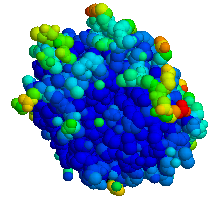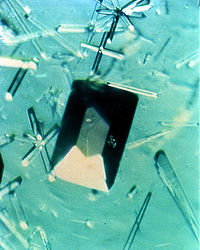Elastase


In molecular biology, elastase is an enzyme from the class of proteases (peptidases) that break down proteins,[1] specifically one that can break down elastin. In other words, the name only refers to the substrate specificity (i.e. what proteins it can digest), not to any kind of evolutionary grouping.[2]
Forms and classification
[edit]Eight human genes exist for elastase:
| Family | Gene symbol | Protein name | EC number | ||
|---|---|---|---|---|---|
| Approved | Previous | Approved | Previous | ||
| chymotrypsin- like |
CELA1 | ELA1 | chymotrypsin-like elastase family, member 1 | elastase 1, pancreatic | EC 3.4.21.36 |
| CELA2A | ELA2A | chymotrypsin-like elastase family, member 2A | elastase 2A, pancreatic | EC 3.4.21.71 | |
| CELA2B | ELA2B | chymotrypsin-like elastase family, member 2B | elastase 2B, pancreatic | EC 3.4.21.71 | |
| CELA3A | ELA3A | chymotrypsin-like elastase family, member 3A | elastase 3A, pancreatic | EC 3.4.21.70 | |
| CELA3B | ELA3B | chymotrypsin-like elastase family, member 3B | elastase 3B, pancreatic | EC 3.4.21.70 | |
| chymotrypsin | CTRC | ELA4 | chymotrypsin C (caldecrin) | elastase 4 | EC 3.4.21.2 |
| neutrophil | ELANE | ELA2 | neutrophil elastase | elastase 2 | EC 3.4.21.37 |
| macrophage | MMP12 | HME | macrophage metalloelastase | macrophage elastase | EC 3.4.24.65 |
The four "pancreatic elastases", chymotrypsin, and neutrophil elastase are serine proteases.[3] The "macrophage elastase" is a matrix metallopeptidase.
Chymotrypsin is weaker at digesting elastin than the architypical pancreatic elastase.[4]
Some bacteria (including Pseudomonas aeruginosa) also produce elastase; bacterial elestases work in many ways and include serine proteases, aspartic proteases, thiol proteases, and metalloenzymes.[2]
Function
[edit]The fact that elastase can break down elastin in test tubes (while other proteases cannot) does not imply that there is a unifying function for all elastases in the living body. Instead, they each have their own role:
- The pancreatic elastase (as well as chymotrypsin) is responsible for digesting proteins in food. Note that "pancreatic elastase 1" is, in fact, not found in the pancreas, but produced in the skin.[5]
- "Pancreatic elastase 1" (CELA1) is expressed in skin keratinocytes.[6]
- Neutrophil elastase breaks down the Outer membrane protein A (OmpA) of E. coli and other Gram-negative bacteria, killing the bacterium carrying the protein.[7] It also very effectively breaks down Shigella virulence factors.[8]
- In bacteria, secreted elastase breaks down host connective tissue proteins, causing tissue damage and inflammation. As a result, it's considered a virulence factor.[9]
Elastases of the serine protease type preferentially break down peptide bonds on the carboxyl side of small, hydrophobic amino acids such as glycine, alanine, and valine.
Role of human elastase in disease
[edit]A1AT
[edit]Elastase is inhibited by the acute-phase protein α1-antitrypsin (A1AT), which binds almost irreversibly to the active site of elastase and trypsin. A1AT is normally secreted by the liver cells into the serum. Alpha-1 antitrypsin deficiency (A1AD) leads to uninhibited destruction of elastic fibre by elastase; the main result is emphysema.
Cyclic neutropenia
[edit]The rare disease cyclic neutropenia (also called "cyclic hematopoeiesis") is an autosomal dominant genetic disorder characterised by fluctuating neutrophil granulocyte counts over 21-day periods. During neutropenia, patients are at risk for infections. In 1999, this disease was linked to disorders in the ELA-2 / ELANE gene.[10] Other forms of congenital neutropenia also appear to be linked to ELA-2 mutations.[citation needed]
Other diseases
[edit]Neutrophil elastase is responsible for the blistering in bullous pemphigoid, a skin condition, in the presence of antibodies. It may also play a role in the formation of abdominal aortic aneurysms (AAAs) and chronic obstructive pulmonary disease (COPD).
Role of bacterial elastase in disease
[edit]Elastase has been shown to disrupt tight junctions, cause proteolytic damage to tissue, break down cytokines and alpha proteinase inhibitor, cleave immunoglobulin A and G (IgA, IgG), and cleave both C3bi, a component of the complement system, and CR1, a receptor on neutrophils for another complement molecule involved in phagocytosis. The cleavage of IgA, IgG, C3bi, and CR1 contributes to a decrease of the ability of neutrophils to kill bacteria by phagocytosis. Together, all these factors contribute to human pathology.
References
[edit]- ^ Bieth JG (2001). "[The elastases]". J. Soc. Biol. (in French). 195 (2): 173–9. doi:10.1051/jbio/2001195020173. PMID 11723830.
- ^ a b AlShaikh-Mubarak, GA; Kotb, E; Alabdalall, AH; Aldayel, MF (2023). "A survey of elastase-producing bacteria and characteristics of the most potent producer, Priestia megaterium gasm32". PLOS ONE. 18 (3): e0282963. Bibcode:2023PLoSO..1882963A. doi:10.1371/journal.pone.0282963. PMC 10010523. PMID 36913358.
- ^ Bruce, Alberts (2014-11-18). Molecular biology of the cell (Sixth ed.). New York, NY. ISBN 9780815344322. OCLC 887605755.
{{cite book}}: CS1 maint: location missing publisher (link) - ^ Collins, JF; Thoman, PJ; Shaw, SL; Fine, R (1985). "Studies on the elastolytic activity of chymotrypsin". Connective Tissue Research. 13 (4): 291–8. doi:10.3109/03008208509152410. PMID 3161694.
- ^ Largman C, Brodrick JW, Geokas MC (1976). "Purification and characterization of two human pancreatic elastases". Biochemistry. 15 (11): 2491–500. doi:10.1021/bi00656a036. PMID 819031.
- ^ Talas U, Dunlop J, Khalaf S, Leigh IM, Kelsell DP (January 2000). "Human elastase 1: evidence for expression in the skin and the identification of a frequent frameshift polymorphism". J. Invest. Dermatol. 114 (1): 165–70. doi:10.1046/j.1523-1747.2000.00825.x. PMID 10620133.
- ^ Belaaouaj, A; Kim, KS; Shapiro, SD (18 August 2000). "Degradation of outer membrane protein A in Escherichia coli killing by neutrophil elastase". Science. 289 (5482): 1185–8. Bibcode:2000Sci...289.1185B. doi:10.1126/science.289.5482.1185. PMID 10947984.
- ^ Weinrauch, Y; Drujan, D; Shapiro, SD; Weiss, J; Zychlinsky, A (2 May 2002). "Neutrophil elastase targets virulence factors of enterobacteria". Nature. 417 (6884): 91–4. Bibcode:2002Natur.417...91W. doi:10.1038/417091a. PMID 12018205.
- ^ Llanos, Agustina; Achard, Pauline; Bousquet, Justine; Lozano, Clarisse; Zalacain, Magdalena; Sable, Carole; Revillet, Hélène; Murris, Marlène; Mittaine, Marie; Lemonnier, Marc; Everett, Martin (30 August 2023). "Higher levels of Pseudomonas aeruginosa LasB elastase expression are associated with early-stage infection in cystic fibrosis patients". Scientific Reports. 13 (1): 14208. Bibcode:2023NatSR..1314208L. doi:10.1038/s41598-023-41333-9. PMC 10468528. PMID 37648735.
- ^ Horwitz M, Benson KF, Person RE, Aprikyan AG, Dale DC (1999). "Mutations in ELA2, encoding neutrophil elastase, define a 21-day biological clock in cyclic haematopoiesis". Nat. Genet. 23 (4): 433–6. doi:10.1038/70544. PMID 10581030. S2CID 6951666.
